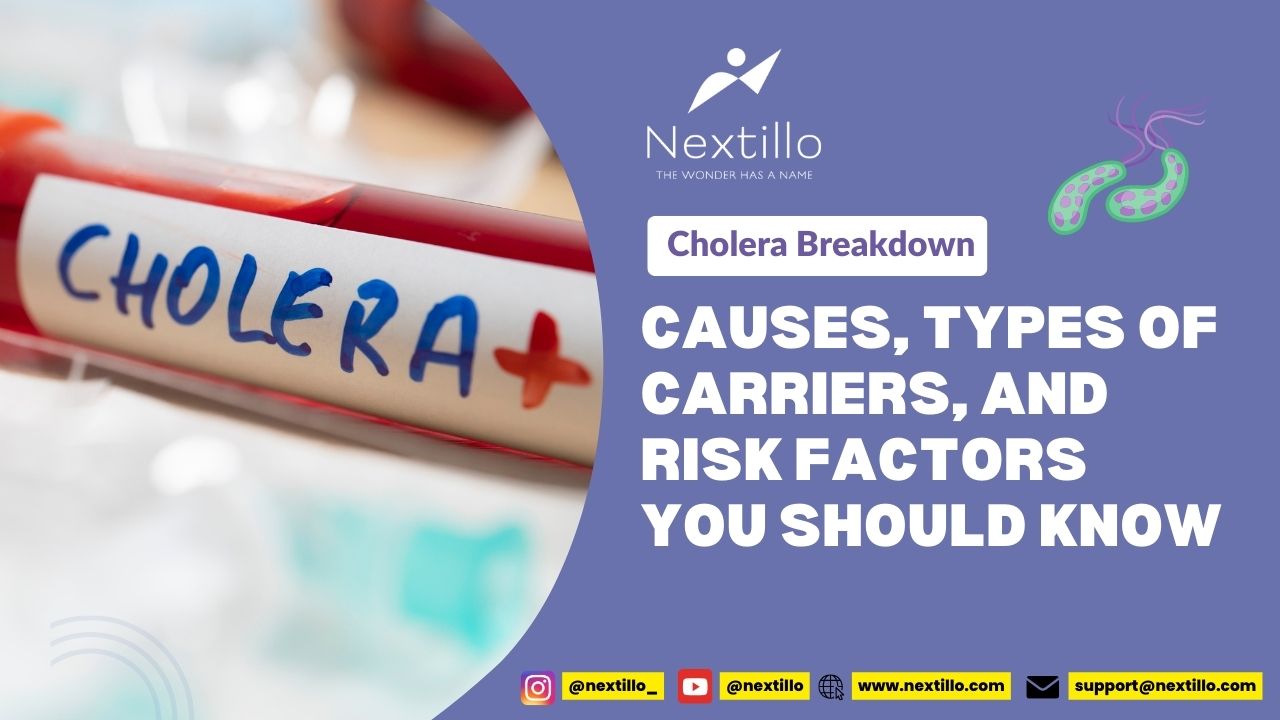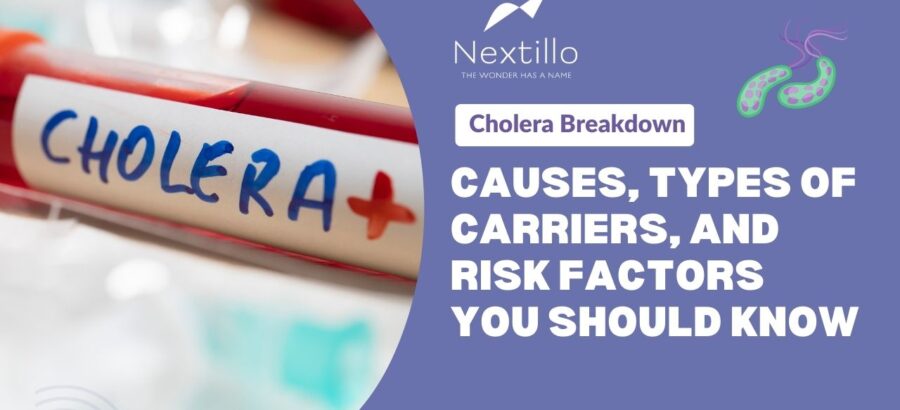Cholera is a fatal disease that causes severe vomiting and watery diarrhea. The organism Vibrio cholera easily passes through areas of poor hygiene and can dehydrate the affected individual on a very severe level, which can lead to death without treatment. It causes watery diarrhea.
Here’s how it affects:
- Consuming infected water from unhygienic sources or the ponds and wells.
- Eating raw or undercooked seafood or fruits and vegetables washed with contaminated water.
- Lack of hand hygiene.
- Floods or natural disasters disrupt water and sanitation systems, which lead to optimal conditions for outbreaks.
- Once these bacteria enter the body, they release a poison that ravages the bones, causing harsh diarrhea and dehydration.
Types of Cholera Carriers
Carriers—those who have the bacteria but are not ill from it—are primarily responsible for the rapid transmission of cholera. There are three main types:
Asymptomatic Carriers
The animals show no signs of illness but shed the bug in their feces for up to two weeks. In congested regions, this goes undetected as they disperse the illness devoid of perhaps imagined.
Convalescent Carriers
The second hidden threat is that people who have had cholera—even after they feel better and their symptoms are gone—can continue to shed the germ for weeks.
Chronic Carriers
Chronic carriers, which are relatively uncommon, will harbor Vibrio cholerae in their intestine or gallbladder for months and sometimes years. They are usually associated with chronic foci in endemic regions.
Symptoms and presentation:
Silent carriers: 6 out of 7 infected with Vibrio cholerae do not show symptoms but, through their feces, transmit the bacteria for up to ten days—the unbroken chain of asymptomatic infection. The cholera incubation period surfaces between 12 hours and 5 days after exposure, leaving us with very little window for early detection.
Mild to Fatal: Most patients suffer from mild or moderate symptoms, but a small percentage have a quickly developing acute watery diarrhea that can cause dehydration and death. Cholera, a known swift killer: Untreated, severe cholera can kill in hours. It is essential to seek immediate medical attention and rehydration therapy. Spread through infected food or water, cholera lurks beneath the surface, making necessities into possible killers. Carriers shed the bacteria back into the environment even without symptoms, perpetuating the cycle of infection. But it is easily treatable to survive cholera—all you need is some proper hydration and timely medical treatment.
Cholera Treatment:
Easily Treatable:
- Most cases can be treated with oral rehydration solution (ORS) diluted from a standard WHO/UNICEF packet in 1 liter of clean water.
- Adults may require SQ of ORS, as needed, up to 6 liters on the first day for moderate dehydration.
Severe Cases:
IV fluids for severe dehydration to prevent shock Antibiotics shorten the duration of diarrhea, reduce fluid requirements, and decrease bacterial shedding.
Nutritional Support:
At its best, patients can begin to eat local and safe food as soon as possible. continued breastfeeding among infants and toddlers.
Community Reach to Treatment:
Points for oral rehydration (ORPs) and larger treatment centers providing intravenous services are key in outbreaks.
Swift treatment: → if taken care of, fewer than 1 in 100 people die.
Adjunct Therapy for Kid
Children receive zinc supplements to decrease the duration of diarrhea and prevent future bouts of watery diarrhea for children less than 5.
Antibiotics Caution:
Administering antibiotics to large groups is not advisable, as it does little to halt cholera transmission and carries a high risk of promoting AMR.
Vaccines:
Available Vaccines:
The three WHO-prequalified Oral Cholera Vaccines (OCVs) include Dukoral®, ShancholTM, and Euvichol-Plus®. Each needs two doses for full protection.
Dukoral®:
- Provided with a buffer (150 ml of clean water for adults.)
- Recommended for those aged 2 years and older; a third dose is required for children ages 2–5: 7 days to 6 weeks between doses
- Serves up to 2 years of protection, best for tourists
ShancholTM and Euvichol-Plus®
- Identical formulations were purchased from different manufacturers without the need for a buffer solution. For ages 1 and older; given every at least every 2 weeks
- Provide three years (or more) of protection with two doses, while a single dose offers short-term protection.
Elements that make ShancholTM stand out:
Approved for use in a controlled temperature chain (CTC), enabling it to be retained outside conventional cold chain conditions (+2°C to +8°C) for prescribed periods, with close monitoring applied when out of the traditional conditions.
Mass vaccination campaigns:
The main vaccines used in mass campaigns supported by the Global OCV Stockpile and Gavi, the Vaccine Alliance, are ShancholTM and Euvichol-Plus®.
More than 145 million doses were deployed to the outbreak, humanitarian and cholera hotspots
WHO Recommendations (2017)
OCVs need to be used together with other cholera prevention and control measures.
When cholera is endemic, during an outbreak, or in areas with a high risk of cholera in the context of humanitarian crises. Mass vaccinations should never postpone other life-saving interventions.
Risk Factors for Cholera
Cholera may affect anyone who ingests feces-contaminated food or water due to cholera, but some are more prone than others to become sick.
Poor Sanitation:
Such an infection poses a greater risk in places that lack access to purified drinking water or proper sewage disposal facilities.
Malnutrition:
A child has a weaker immune system, so the body finds it harder to resist the infection.
Crowded Living Conditions:
Crowding humans into places such as refugee camps or urban slums makes the transmission of endemic diseases easier.
Unvaccinated Individuals:
Vaccination is an important method of protection against cholera, which is endemic. Without it, the risk is significantly higher.
Travel to Endemic Areas:
Those at greatest risk are unprotected individuals going to areas of cholera transmission.
Compromised Health:
Higher risk for severe disease if you have conditions like diabetes, liver disease, or no immune system.
How to Protect Yourself
The consolation is that cholera is preventable. Here’s how you can stay safe:
- Water Safe: Before drinking, boil or otherwise treat the water. However, when traveling, it is safer to drink bottled water.
- Wash your hands regularly with soap and warm water.
- Don’t eat uncooked or unwashed foods
- Proper personal hygiene and surroundings.







